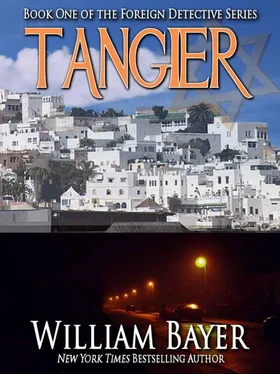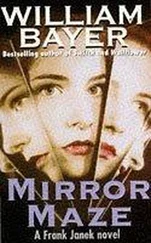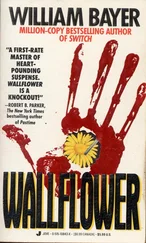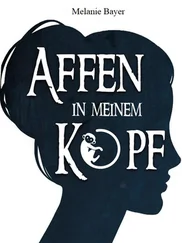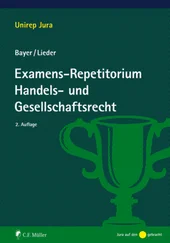William Bayer - Tangier
Здесь есть возможность читать онлайн «William Bayer - Tangier» весь текст электронной книги совершенно бесплатно (целиком полную версию без сокращений). В некоторых случаях можно слушать аудио, скачать через торрент в формате fb2 и присутствует краткое содержание. Жанр: Криминальный детектив, на английском языке. Описание произведения, (предисловие) а так же отзывы посетителей доступны на портале библиотеки ЛибКат.
- Название:Tangier
- Автор:
- Жанр:
- Год:неизвестен
- ISBN:нет данных
- Рейтинг книги:5 / 5. Голосов: 1
-
Избранное:Добавить в избранное
- Отзывы:
-
Ваша оценка:
- 100
- 1
- 2
- 3
- 4
- 5
Tangier: краткое содержание, описание и аннотация
Предлагаем к чтению аннотацию, описание, краткое содержание или предисловие (зависит от того, что написал сам автор книги «Tangier»). Если вы не нашли необходимую информацию о книге — напишите в комментариях, мы постараемся отыскать её.
Tangier — читать онлайн бесплатно полную книгу (весь текст) целиком
Ниже представлен текст книги, разбитый по страницам. Система сохранения места последней прочитанной страницы, позволяет с удобством читать онлайн бесплатно книгу «Tangier», без необходимости каждый раз заново искать на чём Вы остановились. Поставьте закладку, и сможете в любой момент перейти на страницу, на которой закончили чтение.
Интервал:
Закладка:
For a while Hamid stared at him, then finally he spoke. "You think I'm shocked by what you've said? Believe me-I'm not. I'm only amazed by your arrogance. And your righteous certainty, which makes me sick."
Achar laughed. "Well, Hamid-perhaps you're right. I try not to be arrogant, at least not in the Dr. Schweitzer sense. But yes, I am certain that I'm right. How else can I sustain myself? However, let's lower the level of abstraction. I know that politics isn't your game. So let's talk about you. Let's see where you fit in."
"I don't fit into any of this."
"Maybe, but don't be too sure. I said you were observed by my friends during the burning of Peter's shop. You're well known in Dradeb. You're from our quarter. Most of the people here know you're an inspector of police. All right, there you were, standing up there on that ledge with a revolver in your hand. You were threatening the people down on the bridge, making it quite clear you didn't like what they were doing and were going to shoot them if they didn't stop. Well, they did stop. There was a little pause, the sort of moment that even a single man can use to turn a mob around. So, there you were, prepared to shoot, but then you lowered your gun, and suddenly they felt released. Yes, Hamid! That's what your action meant to them. It was a signal. It told them you wouldn't shoot. You, a policeman, releasing them to go on, an even more powerful trigger than the one on your gun."
"What are you talking about? They'd burned the shop! Peter was already dead!"
"Yes! And a few of them were already on the Mountain. But not the mob that ran up there later on."
"You're crazy!"
"Why didn't you shoot them, then?"
"I don't know. I couldn't do it. I don't have the heart for things like that."
"Ah! There you are! You didn't have the heart. It was your duty to do what you could to protect the Mountain. When you chose not to do your duty, you showed your heart was with the mob."
"Well, Mohammed, it isn't as clear as that. You're simplifying everything, trying to catch me in a trap."
"It is simple, Hamid. The people on that bridge were quite certain what they saw. At that moment you were the regime. You held a gun on them, and when you lowered it you announced that you stood with them."
"I don't think so."
"Well, I do. By the way, I hope this doesn't land you in trouble. It shouldn't if you brazen it out when you're called up to explain."
"You're crazy, making me out as a collaborator. Anyone who knows me knows I could never be that."
"All right, Hamid. Have it that way if you like. But think about it just the same. Maybe you'll change your mind."
Hamid glared at him. He was angry now. "What do you want from me?" he asked. "What are you trying to do?"
"There's no trap, Hamid, but I do want something. I want you. You could be such a help. Listen-there's a new era ahead, a new Morocco, a new society to be forged. You could have a place in it, play an important role. It isn't enough merely to understand the rage. One must feel it, and I know you do. I've seen you change over the last few months. I've seen you grow impatient with your work. Forget the foreigners. The logic is with us. I need you, Hamid. I want you to join me in this thing."
Late that afternoon he and Kalinka stood alone in a corner of the European cemetery at Bourbana watching four Moroccan gravediggers lower the body of Peter Zvegintzov into the ground. Hamid had bought the coffin; Kalinka had commissioned a little granite marker on Hassan II. The text was simple and written in French: "Peter Zvegintzov, entrepreneur," it said, and then the date of his birth in Hanoi, and of his death in Tangier.
"Poor Peter," Kalinka said when the grave was finally covered. "He had no friends here. No one at all."
"Still he'll be missed," said Hamid. "He once told me that the Europeans on the Mountain couldn't survive here without his help. He was a cushion, he said, between us and them. Perhaps now they'll find it a harder town."
"But still," she said, "they never liked him. He was not a sympathetic man."
He glanced at her-they were walking between long narrow rows of graves. Peter had been her last connection with the past, but now to Hamid she seemed strong, perhaps stronger than she'd ever been.
"They had a service for Luscombe at the British church," he said. " 'A good turnout,' as the British say. The new vicar, they tell me, speaks very well. As for the Freys-no one has come to claim them yet. I suppose we'll have to bury them at government expense."
They walked on in silence, down the long rows where Europeans who had lived in Tangier were laid to rest. The cemetery was crowded; there was little room left in it now. Perhaps, he thought, this was a sign that the European presence was nearly at its end.
"I keep asking myself," he said, starting up the car, "why I didn't shoot at those people, the real reason I lowered my gun. Achar says I was with them, but I'm not sure he's correct. It was just impossible for me to do it, even though I was furious. Watching Peter die-it was too terrible. I didn't care then about property or law."
She gazed at him, and he saw admiration in her eyes. "You're gentle, Hamid, just and humane. You did what you did because of who you are."
He drove to Ramon y Cahal, accompanied her to the flat. Then while she prepared their dinner he stared out across his terrace at Dradeb and the Mountain beyond.
Achar was right, he thought. I've wasted my life on foreigners. It's no longer important that I understand them. Now I must understand myself.
There came to him then the revelation that what had happened on the Mountain and his own role in it were things that would forever change his life. In that moment when he had stood there, faced with lawlessness and disorder beyond his wildest dreams, he had discovered something important about himself and the sort of man he might become.
He didn't speak much at dinner, instead listened to Kalinka talk of Peter and her memories of him years before.
"Hanoi was beautiful in the spring," she said, "the blossoms on the fruit trees, the laughter on the streets. On Sundays Peter took me for walks around the Petit Lac. Sometimes we'd enter the little Buddhist shrine on the island to take refuge from the rains. We'd stand in there, he'd hold my hand, we'd look at people running from the storm, turn to each other and smile."
She smiled then herself, as Hamid met her eyes-the sad smile that he loved. In that smile was her refusal to ask for pity, her commitment to survive, whatever the shocks that touched her life.
"Oh, Hamid," she said suddenly, "you must go and help Achar. You must keep your job with the police, of course, but you must help him too-you must. He needs you, your qualities, your sense of justice. He's too cold, and he knows it. He needs a warm man beside him like yourself."
Yes, she was right, he knew, and her clarity amazed him-that she, once so confused, so befuddled, now saw things more clearly than himself. She'd said his vision of Tangier had been too narrow, and then she had helped him to see the city in a different way. Was it the example of her mother, he wondered, that extraordinary woman who'd fought so hard for what she thought was right, or was it simply an innate sense Kalinka had of the inequities of the world? He wasn't sure, but knew one thing: that it was her intuitive sense of life, and not the logic of Achar, that now made him want to change.
Yes, somehow she had come to understand the city, had grasped its needs and mood, and now she understood him too, he felt, and the role that he should play. That was what was so marvelous about her-her mysterious grasp of things-and why her presence, no matter how quiet, had always been so good.
He looked up, saw that she was watching him.
Читать дальшеИнтервал:
Закладка:
Похожие книги на «Tangier»
Представляем Вашему вниманию похожие книги на «Tangier» списком для выбора. Мы отобрали схожую по названию и смыслу литературу в надежде предоставить читателям больше вариантов отыскать новые, интересные, ещё непрочитанные произведения.
Обсуждение, отзывы о книге «Tangier» и просто собственные мнения читателей. Оставьте ваши комментарии, напишите, что Вы думаете о произведении, его смысле или главных героях. Укажите что конкретно понравилось, а что нет, и почему Вы так считаете.
